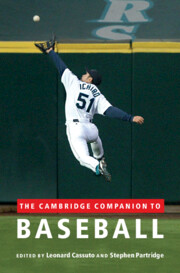Book contents
- Frontmatter
- Introduction
- 1 The rules of baseball
- 2 Baseball in literature, baseball as literature
- 3 Babe Ruth, sabermetrics, and baseball’s politics of greatness
- 4 Not the major leagues: Japanese and Mexican Americans and the national pastime
- 5 Baseball and the color line: from the Negro Leagues to the major leagues
- 6 Baseball and war
- 7 Baseball and the American city
- 8 Baseball at the movies
- 9 The baseball fan
- 10 Baseball and material culture
- 11 Global baseball: Japan and East Asia
- 12 Global baseball: Latin America
- 13 Cheating in baseball
- 14 Baseball’s economic development
- 15 Baseball and mass media
- A guide to further reading
- Index
3 - Babe Ruth, sabermetrics, and baseball’s politics of greatness
Published online by Cambridge University Press: 28 July 2011
- Frontmatter
- Introduction
- 1 The rules of baseball
- 2 Baseball in literature, baseball as literature
- 3 Babe Ruth, sabermetrics, and baseball’s politics of greatness
- 4 Not the major leagues: Japanese and Mexican Americans and the national pastime
- 5 Baseball and the color line: from the Negro Leagues to the major leagues
- 6 Baseball and war
- 7 Baseball and the American city
- 8 Baseball at the movies
- 9 The baseball fan
- 10 Baseball and material culture
- 11 Global baseball: Japan and East Asia
- 12 Global baseball: Latin America
- 13 Cheating in baseball
- 14 Baseball’s economic development
- 15 Baseball and mass media
- A guide to further reading
- Index
Summary
We begin our discussion of baseball greatness by considering Harriet Beecher Stowe, whose career record should speak for itself. Stowe is the author of the abolitionist novel, Uncle Tom's Cabin (1852), the bestselling American book of the entire nineteenth century and probably the most read work of American literature ever. It's also the book that the phrase “the great American novel” was invented to describe. Yet despite Stowe's overwhelming popularity and immense influence in her time and beyond it, literary arbiters – critics and scholars – didn't respect her work, so she was read in few American literature classrooms until a generation ago. Simply put, her work wasn't considered worthy of inclusion in the American literary canon, not considered sufficiently “great” to assign to the nation's youth.
Babe Ruth never had this problem. The most famous baseball player in history, Ruth has been the very measure of greatness in baseball, and also in other sports. Even a contemporary giant like Michael Jordan has often been called the “Babe Ruth of basketball.” Ruth was canonized from the start, and even though all of his most famous records have been broken, his iconic status has never been threatened.
- Type
- Chapter
- Information
- The Cambridge Companion to Baseball , pp. 33 - 48Publisher: Cambridge University PressPrint publication year: 2011



